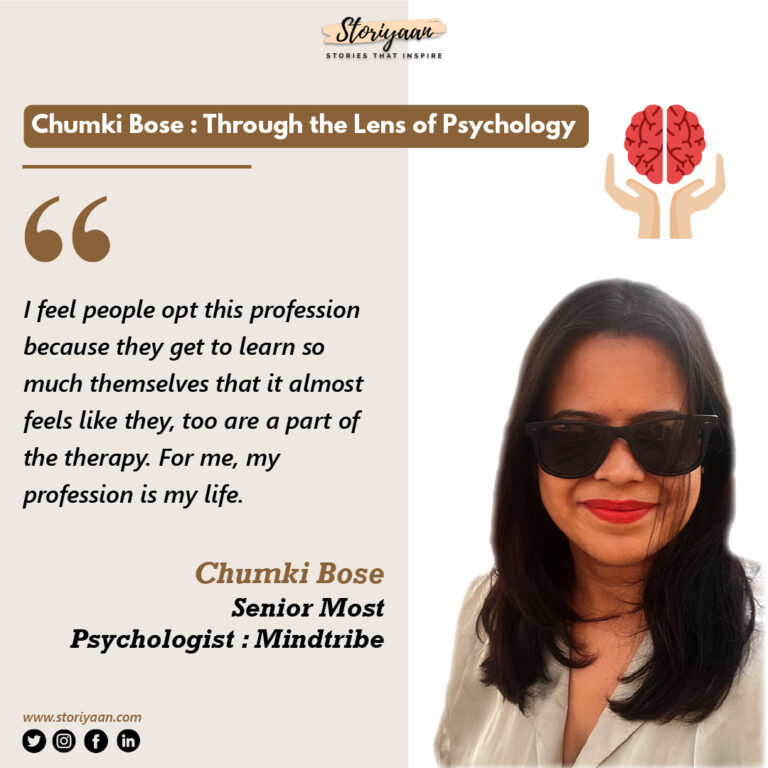“I feel people opt for this profession because they get to learn so much about themselves that it almost feels like they, too are a part of the therapy. For me, my profession is my life,” says Chumki Bose, a psychologist by profession.
When we talk of health, we often tend to rule out mental health. While some are vocal about it, it’s only addressed to the surface. There is more to mental health than depression and we need people to come to the forefront and speak about it. Chumki Bose is one such person who is working to eliminate the stigma around mental health and doing her bit in giving people a fresh perspective towards life.
Here’s awaiting an interesting conversation about mental health, red–flags, signs of depression in people, eating disorders and a lot more with Chumki Bose. Be a part of the conversation and continue reading to know more.

Chumki Bose- Through the lens of psychology
Interview
Questions and answers
Considering you have a personal experience with the challenges your clients face, is it difficult at times to separate yourself from your work?
Initially, every psychologist goes through this ordeal. When I had started out, it was a bit difficult for me but as a psychologist it’s a part of our training to keep yourself separate from the client’s experience and being empathetic at the same time. It is of utmost importance to be objective, in order to help the client in overcoming the challenge that they are facing.
With the exhaustive nature of your work, do you ever get burned out?
Yes, it is exhaustive for sure and I do get burned out sometimes. This was more frequent at the beginning of the practice. However, now that I can manage well, the burnouts rates have reduced considerably. The trick is to space your personal time and work time in a way that you can indulge in the things you love and care for.
On the other end of the spectrum, your work seems incredibly rewarding and gratifying. What’s it like to help people and make a difference in their lives?
I believe that it is one an immensely gratifying and humbling profession.. The feeling of being able to support people in giving another chance at life, is wonderful.
I feel people opt this profession because they get to learn so much about themselves that it almost feels like they, too are a part of the therapy. For me, my profession is my life.
What do you consider your greatest contribution in the life of your clients when it comes to viewing Mental health through a holistic lens?
My biggest contribution would be in the field of developmental psychology, because I believe that every behavior that is causing an issue currently in the patient’s life has a root in their childhood and helped them survive. Not saying that all of those mechanisms are faulty but some have become outdated as an adult. Although I believe that every psychotherapist has a different way of dealing with their patient’s issues. Some have a symptomatology method of dealing with the mental health issues but I prefer the longer route so that the client can have a better understanding of themselves and the narrative of their lives.
What has been the biggest barrier to treatment of people with mental illness and specifically when they begin to act out?
I think society and family are the biggest barrier. I do not blame them because mental health is not something everyone is still clear about.. Thus, neither people in general nor the society can relate to it instantly. Similar is the case with the person who is battling mental issue as they are also not able to understand what they’re going through because such behaviors have been normalised over the years. As such issues are not externally visible and unlike a scar or wound which draws immediate sympathy and attention, mental issues are left unattended. So, there are many challenges that such a person has to face;From accepting it themselves, to reaching out for treatment to finally overcoming and resolving their barriers successfully; it is quite a tough fight.
What are some ways in which we can recognize symptoms of mental illness in our friends and near ones, especially when they fail to recognize it themselves?
The individual’s daily functioning is impaired. They don’t take a bath, don’t change clothes, don’t have a routine or a goal for example. The interest towards life that they used to have earlier starts deteriorating, sometimes it also shows as aggression, being overly critical or negative. Also, such people would have impaired relations with the people around. They may be going through multiple breakups or divorces. These are the top most signs that indicates the status of your mental health.
Psychologists often have boundaries when communicating with family members and caretakers of their patients because of the confidentiality laws. What are some of the perks and banes that come as a result of these laws and how flexible are they in emergency situations?
As health care professionals, patients are important to us and so is their consent. We cannot discuss issues that are shared during the sessions with their family members or friends. The patient needs to feel safe and it is the job of the psychologist to assure that commitment, otherwise it would be hard to communicate. Only in extreme cases if the patient threatens self-harm or harming someone else, we are supposed to inform our supervisors, family members or their friends who might get impacted with it.
What are some of the red flags to look out for in someone suffering from any sort of mental illness that they go to the point where they might pose danger to self as well as for others, and how can we deal with the person in such scenarios?
Depending on the severity the person needs immediate medications. At first, one should reach out to a psychiatrist so that symptoms are taken under control. Much delay might cause emergency situation and it will be impossible for the therapist to tackle that. However, medication alone cant cure you because you need to reach to untangling of underlying thoughts and emotions. So,, for an effective result, the next step should be to reach out to a therapist for treatment. As a first aid if you see somebody harming themselves, you must be sensible in your dealings rather than accusing them. Psychotherapy is irreplaceable in treatment of mental health issues and a majority of people might never need medicines.
What would be your advice to those who try to deal with their mental health issues from YouTube/Instagram influencers or through self-help books from someone who is not qualified in the field of psychology?
Self-help is also a good option to go for when managing your life becomes an uphill task. As I said earlier, it all depends on the severity of your problems. Many times I’ve noticed that self-help books, Instagram and YouTube videos turn out to repress the issues of the sufferer. Repression has a direct co- relation to depression.
After a while or so if you still have those persistent behavior patterns that are causing trouble in your life then there is nothing better than reaching out to a psychologist. According to me everybody should see a therapist once in 10-15 days to stay Healthy and fit.. There is no harm taking care of your physical and mental health together.
Quick 5
- Self-care to you is Sitting with a cup of coffee and thinking about my entire day
- A book you swear by Sapiens by Yuval Noah Harari
- One word to describe the psychologist in you Empathically blunt
- Mental health can also be? Speaking to your best friend about how bad your day was or how bad you feel today.
- The best exercise to calm anxiety The 5-4-3-2-1 grounding technique

